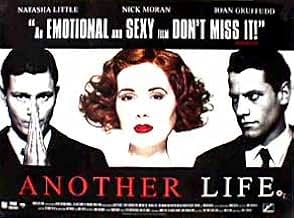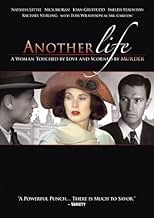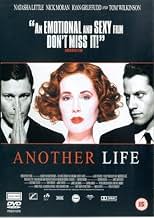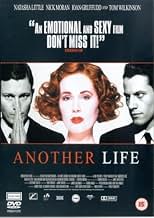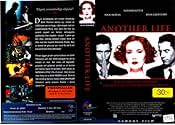A woman is wrongly accused of murdering her husband in the early 1920s, in London.A woman is wrongly accused of murdering her husband in the early 1920s, in London.A woman is wrongly accused of murdering her husband in the early 1920s, in London.
- Awards
- 1 win & 1 nomination total
- Director
- Writer
- All cast & crew
- Production, box office & more at IMDbPro
Featured reviews
I hope to see this film one day. I don't even recall it being released in the U.S.
The Thompson - Bywaters Case of 1922 - 23 was one of the great disgraces of British Justice. Edith Thompson was accused of instigating her boyfriend, Frederick Bywaters, in stabbing her husband Percy on a street in London at night. To his credit, Frederick denied her involvement - he claimed he killed Percy for mistreating Edith. Unfortunately for Edith (a woman with a big imagination) letters she wrote to Bywaters were preserved by him, and they suggested that she had tried to poison Percy on several occasions. Problem was that the crown pathologist, Sir Bernard Spilsbury, never found traces of the so-called poisons. The solution by the prosecution: ignore Sir Bernard (normally trotted out at every major criminal prosecution at the time) and concentrate on the evidence that Edith and Frederic were committing adultery. Although ably defended by Sir Henry Curtis Bennett, Edith made the mistake of going into the witness box, and she suddenly panicked inside it. It sank whatever chances she had. The jury found her and Frederick guilty, and they were executed.
The judge at the trial, Mr. Justice Shearman, had been junior to Edward Marshall Hall in defending the notorious wife murderer George Joseph Smith, and yet he made comments about how sickened he was by Ms Thompson - more sick than at any other killer he came across. The prosecutor was Sir Thomas Inskip. Whatever one says of his ability in railroading Mrs. Thompson, Inskip would mis-serve his country in the late 1930s when he purposely slowed down the rearmament programs of the Baldwin and Chamberlain governments in the face of growing Nazi aggression. These two were the defenders of English hearth and home in this case.
The play A PIN TO SEE A PEEP SHOW is based on a novel by F. Tennyson Jesse, an noted criminal historian (and descendant of the poet Alfred, Lord Tennyson). It is a retelling of the Thompson tragedy.
The Thompson - Bywaters Case of 1922 - 23 was one of the great disgraces of British Justice. Edith Thompson was accused of instigating her boyfriend, Frederick Bywaters, in stabbing her husband Percy on a street in London at night. To his credit, Frederick denied her involvement - he claimed he killed Percy for mistreating Edith. Unfortunately for Edith (a woman with a big imagination) letters she wrote to Bywaters were preserved by him, and they suggested that she had tried to poison Percy on several occasions. Problem was that the crown pathologist, Sir Bernard Spilsbury, never found traces of the so-called poisons. The solution by the prosecution: ignore Sir Bernard (normally trotted out at every major criminal prosecution at the time) and concentrate on the evidence that Edith and Frederic were committing adultery. Although ably defended by Sir Henry Curtis Bennett, Edith made the mistake of going into the witness box, and she suddenly panicked inside it. It sank whatever chances she had. The jury found her and Frederick guilty, and they were executed.
The judge at the trial, Mr. Justice Shearman, had been junior to Edward Marshall Hall in defending the notorious wife murderer George Joseph Smith, and yet he made comments about how sickened he was by Ms Thompson - more sick than at any other killer he came across. The prosecutor was Sir Thomas Inskip. Whatever one says of his ability in railroading Mrs. Thompson, Inskip would mis-serve his country in the late 1930s when he purposely slowed down the rearmament programs of the Baldwin and Chamberlain governments in the face of growing Nazi aggression. These two were the defenders of English hearth and home in this case.
The play A PIN TO SEE A PEEP SHOW is based on a novel by F. Tennyson Jesse, an noted criminal historian (and descendant of the poet Alfred, Lord Tennyson). It is a retelling of the Thompson tragedy.
First, a comment. Edith was the eldest sister in the family. Let's start with a truth. So, finally I got around to watching this film and it took me quite by surprise. For I had previously read some reviews which were, perhaps not necessarily positive. However, I had reservations, mostly about the many technical inaccuracies of so many parts of it. (Far too many to go into) However, bringing the immensely sad story of Edith, Percy and Freddy to the big screen was done with sensitivity.
I am pleased to count as one of my friends, Professor Rene Weis, who wrote Criminal Justice, Edith's life history, and our aim is one of justice, to eventually force the government to offer a posthumous pardon to Edith. To this end, we work very hard. Even eighty-five years after her death.
It therefore quite astonished me that Rene was not mentioned or thanked in the end titles. Certain details in the film clearly showed that the writer/director had read his book and that saddened me.
However, I have to thank him for bringing this subject to a wider audience. If you seen, Let him have it or Dance with a Stranger, similar types of British film (an execution at the end) they were done so much better. Better actors I think. And music. And screenplay. Anyway, seen it at last. I think it must be very difficult to write a great screenplay.
Molly Cutpurse
I am pleased to count as one of my friends, Professor Rene Weis, who wrote Criminal Justice, Edith's life history, and our aim is one of justice, to eventually force the government to offer a posthumous pardon to Edith. To this end, we work very hard. Even eighty-five years after her death.
It therefore quite astonished me that Rene was not mentioned or thanked in the end titles. Certain details in the film clearly showed that the writer/director had read his book and that saddened me.
However, I have to thank him for bringing this subject to a wider audience. If you seen, Let him have it or Dance with a Stranger, similar types of British film (an execution at the end) they were done so much better. Better actors I think. And music. And screenplay. Anyway, seen it at last. I think it must be very difficult to write a great screenplay.
Molly Cutpurse
This is an interesting picture for several reasons. It is primarily a tale of jealousy and murder, but there is virtually no blood. English mysteries are like that. The film forces you to follow the story in order to understand it. You will have no choice but to develop conflicting feelings about the protagonist.
Edie is the younger daughter of a typical English family at the turn of the century. Unlike her parents, younger brother, and older sister, she is what we might describe as a free spirit. She is extremely intelligent. She smokes, she drinks, she plays the coquette with boys, and she eventually lures a hapless weakling into marrying her by providing him with outrageous sex before marriage. This marriage sets the scene for the murder mystery to come. She comes to despise her husband Percy after dallying with a family friend. Her affair with Fred becomes obvious to her husband, her Mum and Dad, and her sister Avis (who is also in love with Fred). Edie doesn't care. Free spirits are willing to leave a trail of broken hearts in their paths.
The story is often told in the first person, and it's this introspection that gives us insight into her character and creates the mixed emotions we have about her. Is she just a self centered dreamer with no thought for the pain she causes those around her? Or is she a calculating narcissist who is willing to sacrifice anything or anyone who gets her way. Is Fred the driving force in this tragedy, or is he just a tool she uses to get what she wants? We come away from this movie wondering, and that is what makes it worth watching.
Edie is the younger daughter of a typical English family at the turn of the century. Unlike her parents, younger brother, and older sister, she is what we might describe as a free spirit. She is extremely intelligent. She smokes, she drinks, she plays the coquette with boys, and she eventually lures a hapless weakling into marrying her by providing him with outrageous sex before marriage. This marriage sets the scene for the murder mystery to come. She comes to despise her husband Percy after dallying with a family friend. Her affair with Fred becomes obvious to her husband, her Mum and Dad, and her sister Avis (who is also in love with Fred). Edie doesn't care. Free spirits are willing to leave a trail of broken hearts in their paths.
The story is often told in the first person, and it's this introspection that gives us insight into her character and creates the mixed emotions we have about her. Is she just a self centered dreamer with no thought for the pain she causes those around her? Or is she a calculating narcissist who is willing to sacrifice anything or anyone who gets her way. Is Fred the driving force in this tragedy, or is he just a tool she uses to get what she wants? We come away from this movie wondering, and that is what makes it worth watching.
There are a few references throughout the reviews to ' Edwardian England' . As Edward the Seventh died in 1910, thus ending the Edwardian Age and as Edith and her husband didn't marry until 1916 ,these are obviously misleading .It is more a picture of English society undergoing a social transformation after the War , in the so-called 'roaring 20's '.
As to the film , it had very solid performances from all concerned although I felt that the conclusion (especially the trial scenes ) was rather too rushed . I always find Ms Little a magical screen presence .Her ability to play confident but vulnerable women is particularly suited to the role .
As to the film , it had very solid performances from all concerned although I felt that the conclusion (especially the trial scenes ) was rather too rushed . I always find Ms Little a magical screen presence .Her ability to play confident but vulnerable women is particularly suited to the role .
The conviction and execution of Edith Thompson is now generally considered to be a miscarriage of justice. I rather thought that that would be the focus of this film. It's not. It's mostly about a failed marriage and an adulterous affair. The murder and the aftermath of it are skimmed over. It is fairly apparent in this depiction that Thompson had no part in the murder but, since the investigation and trial are barely portrayed, it's rather hard to see how she ended up getting hanged for murder. It happened, as far as I can see as a consequence of a weak jury who were unduly influenced by the prejudiced summing up of a rotten old misogynistic judge. Even with that judge she might have survived if she had been properly represented and this dim jury had had the law, and the burden of proof properly explained. That's the story that the film should have concentrated on.
Did you know
- TriviaFinal film of Diana Coupland.
- How long is Another Life?Powered by Alexa
Details
- Release date
- Country of origin
- Official site
- Language
- Also known as
- Iný život
- Filming locations
- Production companies
- See more company credits at IMDbPro
Box office
- Budget
- $5,000,000 (estimated)
Contribute to this page
Suggest an edit or add missing content


